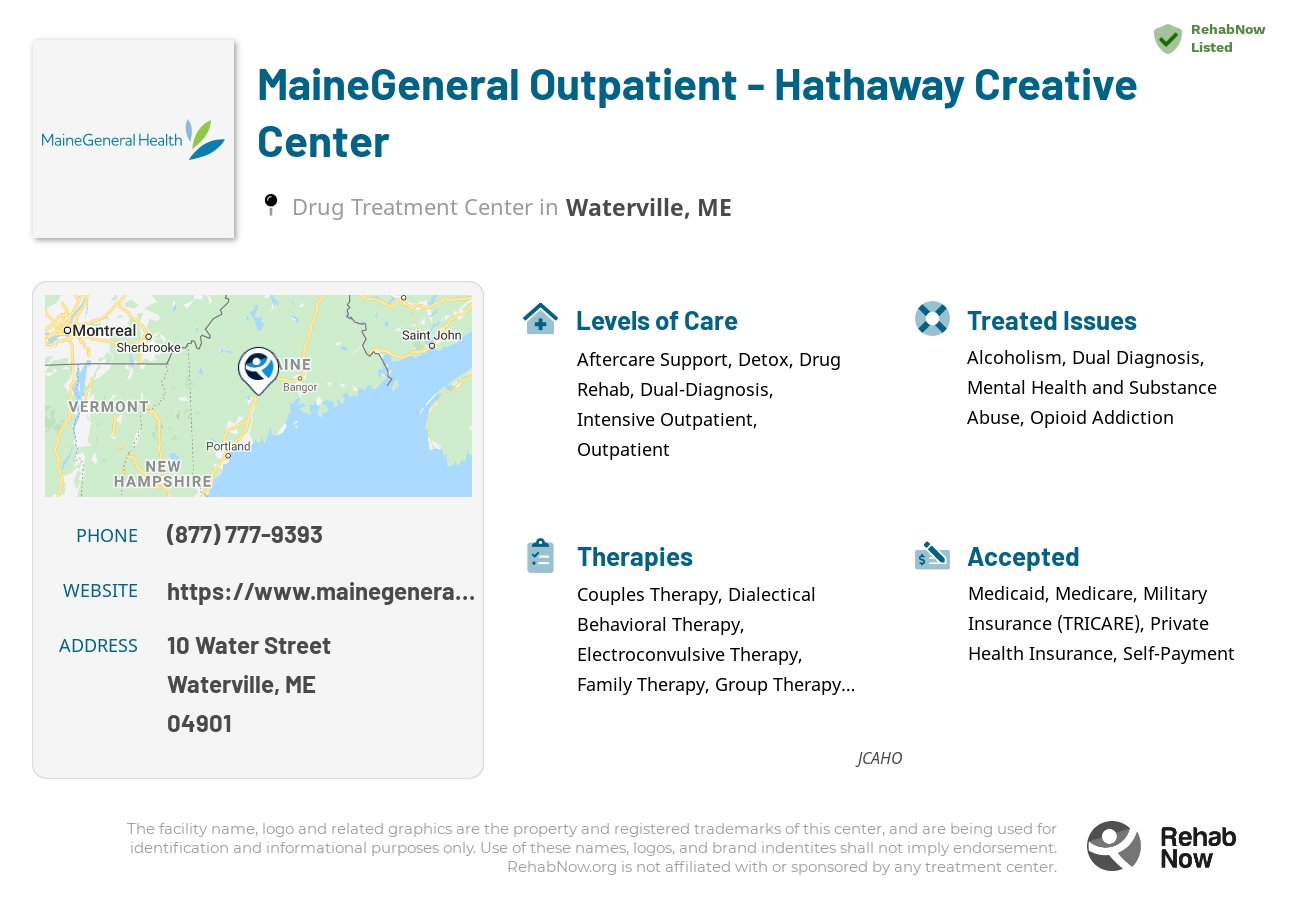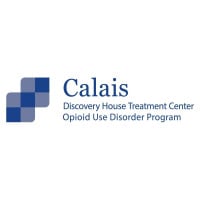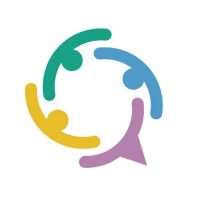MaineGeneral Outpatient - Hathaway Creative Center
Drug Rehab Center in Waterville, Maine
MaineGeneral Outpatient - Hathaway Creative Center provides individualized and specialized treatment and preventative care for individuals dealing with addiction, and is accredited by JCAHO and accepted by most private health insurance policies. Experienced professionals with a dedication to patient wellness are on staff to ensure quality of care.
About MaineGeneral Outpatient - Hathaway Creative Center in Maine
MaineGeneral Outpatient - Hathaway Creative Center is an addiction treatment facility in Waterville, ME, offering a comprehensive range of services to those suffering from alcoholism, dual-diagnosis, opioid addiction, and drug addiction. Their array of treatment options includes aftercare support, detox, drug rehab, dual-diagnosis, intensive outpatient, and outpatient levels of care. The facility is accredited by JCAHO, the gold-standard for healthcare quality, and accepts private health insurance. By partnering with MaineGeneral, the Hathaway Creative Center is able to provide highly effective and compassionate care for those struggling with addiction.
The Hathaway Creative Center provides a combination of evidence-based treatments and individually-tailored care plans to help people struggling with addiction. Working under the guidance of seasoned counselors and medical professionals, clients in Hathaway Creative Center's programs are able to develop meaningful connections to their treatment team, increasing the likelihood of successful recovery. The facility emphasizes day-to-day self-care, education about addiction and relapse prevention, and a safe, supportive environment in which to heal. Methadone treatments and Medication-assisted Treatment are also available. All of these approaches are designed to help clients reach their highest level of well-being and prevent a return to substance use.
Genders
Ages
Modality
Additional
Accreditations

JCAHO
Conditions and Issues Treated
Opioid addiction is when someone becomes addicted to opioids. This can happen quickly due to any opioid use. Opioid withdrawal can be uncomfortable and lead the user to continue using even if they want to quit. It’s best to receive inpatient treatment for detoxification.
Even if a person doesn’t need inpatient treatment, it’s recommended to start rehabilitation or at least some kind of outpatient treatment. This is because the withdrawal symptoms from opioids can be uncomfortable and unpleasant, to the point that a person could end up using again or worse.
Detoxification should be done to break the physical addiction of opioids. This can be done with opioid replacement therapy, medication-assisted therapy, or a more traditional detoxification program. Intensive outpatient treatment is a form of addiction care that allows patients to continue living at home while undergoing treatment. This type of care is appropriate for patients who have been treated in residential treatment programs. Intensive outpatient programs include regular visits to the facility providing therapy, and patients gradually return to their routine life. IOP benefits most when patients have a supportive family member or friend to help them recover.
The first step to getting into an intensive outpatient program is to attend a detoxification facility. Detoxification facilities are designed to remove substances from the body safely. The patient will attend sessions designed to help them understand their addiction and its impact on their lives. While in an intensive outpatient program, therapy sessions are scheduled three to five times per week, with the patient attending no more than two sessions in one day.
Dual Diagnosis therapy is considered more successful than traditional rehab methods because it treats the addiction and the underlying mental health disorder simultaneously. This comprehensive approach gives Waterville, ME patients the best chance for long-term recovery. If the patient does not receive treatment for both conditions, they are more likely to relapse.
Levels of Care Offered
This center offers a variety of custom treatment tailored to individual recovery. Currently available are Aftercare Support, Detox, Drug Rehab, Dual-Diagnosis, Intensive Outpatient, Outpatient, with additional therapies available as listed below.
Detox is the process by which toxins are removed from the body. In substance abuse, detox refers to the process of getting rid of the drugs that are already there in the system once the patient stops its further intake. Detox is the initial step in the recovery process. The physiological dependence on the drug over a period can lead to withdrawal symptoms.
Depending on the severity of the symptoms, the detox process is managed either medically or clinically. While Medically assisted detox relies on the usage of specific medicines, clinal or social detox relies on providing emotional and psychological support to the patient.
An intensive outpatient treatment program, or IOP, is set up for those struggling with an addiction to begin the recovery process. However, the patient will not live at the facility during treatment.
IOP involves patients coming in and out of a medical office building regularly to receive therapy and other services while continuing their life outside of these visits.
IOP is a step up from drug detoxification or alcohol detox. However, it’s still considered a phase of recovery rather than the ultimate goal. There are many rehabs and treatment facilities available to patients in need of IOP.
Outpatient treatment consists of counseling and therapy sessions. The outpatient treatment process begins with the addict’s initial detox period, lasting about ten days. Outpatient treatment is used for those who are at moderate risk for “slipping back” into the addiction. It is also used for those who are not currently experiencing any side effects from withdrawal, can handle social pressure, have a stable living environment, and have a good support system.
Aftercare support is often overlooked in the treatment of drug and alcohol addiction. However, it’s an essential part and should be considered when planning a course of rehab.
Aftercare is a term that’s used to refer to any sort of continuing care offered for a drug addict who has voluntarily entered a rehabilitation program. This type of care can be provided in several settings, including outpatient therapy sessions after the addict has completed an inpatient program. There are also 12-step support groups, such as Alcoholics Anonymous, which can provide additional help for addicts trying to stay sober.
Aftercare is vital because addicts often face many challenges as they attempt to recover from drug addiction or alcoholism. Because of the powerful nature of these addictions, those who struggle with a drug or alcohol problem will likely have to face the craving for their substance of choice for the rest of their lives. Recovering can be a lonely and frustrating endeavor, especially without the support of others who are going through similar situations.
Therapies & Programs
Individual Therapy is a crucial component of addiction recovery. Therapists work with patients to identify the root of their addiction and figure out how to better handle the issues that led to them using drugs. Individual Therapy is one on one sessions where people meet with their therapist. Individual therapy provides a safe space for people to open up and discuss personal and sensitive topics which they may not feel comfortable discussing in a group setting.
In this type of therapy, therapists can develop specific solutions for each patient, which helps speed up their recovery process. In addiction recovery, therapy is a crucial part. It allows patients to go deep into their core issues and discover how those problems can be better handled now. Therapy can be performed in individual sessions as well as group settings. In individual therapy for addiction, the patient meets with the therapist one-on-one to focus on the underlying issues of addiction and come up with solutions to prevent future abuse.
Addiction can take a heavy toll on relationships, damage the trust and intimacy that was once there. Couples therapy at MaineGeneral Outpatient - Hathaway Creative Center helps to rebuild the trust and intimacy that has been damaged. An intimate relationship with a drug addict is not healthy for children or anyone in the family. Therapist help to rebalance family roles and create a healthier environment after rehab in Waterville, ME.
Family therapy is a crucial part of drug treatment and getting sober. It is one of the most effective ways to help addicts stay on the path to long-term sobriety. One of the most important parts of family therapy is the relapse prevention plan. During treatment, therapists and doctors will often sit down with the addict and their family to develop a plan if the addict ever feels like they want to use again. This plan should involve steps the addict and family can take together to prevent them from relapsing in the future.
An addict’s family can play a vital part in helping them to avoid relapse because they can spot the warning signs and help them get back on track before it becomes too much of a problem. Family therapy is one of the most effective ways to help addicts stay on the path to long-term sobriety.
Group Therapy is employed by drug treatment centers like MaineGeneral Outpatient - Hathaway Creative Center to provide the recovering addict with a platform to talk about their feelings and experiences. It also provides for an opportunity to learn from other addicts who have successfully overcome their addiction. It is recommended that all group members be recovering addicts for this type of therapy to work.
This type of therapy involves the use of a variety of therapeutic techniques to help addicts recover from past traumas that might have triggered their substance abuse. During these sessions, therapists will work with the addict to address painful memories and learn how to cope effectively with stressors as they arise.
During these types of sessions, therapists will typically focus on three main goals:
- Identifying and expressing painful emotions associated with past traumas.
- Reducing the effects of stress on an addict’s life by developing more effective coping mechanisms.
- Developing healthy ways of thinking about stressful situations that can help addicts avoid substance abuse issues in the future.
This type of therapy is typically used in conjunction with other types of addiction treatment services. By identifying and dealing with the root cause of addiction, most addicts can overcome their cravings and prevent relapse once they leave rehab.
Many different types of addiction treatment services exist to help addicts safely get sober, but it’s important for recovering individuals to find a therapist or support group that will help them address the root cause of their addiction.
Dialectical behavior therapy (DBT) is a type of cognitive behavioral therapy that is focused on helping those with problematic behaviors caused by intense emotions and thoughts control and regulate their emotions and behavior.
Dialectic Behavior Therapy is beneficial for:
- People who have chronic suicidal thoughts and behaviors
- People who have chronic drug cravings
- People who have difficulty establishing and maintaining personal relationships
- People who have a mental disorder such as Borderline Personality Disorder
- People who have experienced trauma in their life
Life Skills Services provide services aimed at helping people enter into and maintain long-term sobriety. The services are offered at varying levels of intensity, specific to the needs and requirements of each patient. Some benefits of these services are restoring hope and empowerment, enhancing family involvement, increasing patient compliance, and reducing relapse rates.
Training someone on improved life skills allows someone recovering from an addiction to feel more capable of taking care of him or herself. The skills taught in MaineGeneral Outpatient - Hathaway Creative Center are daily skills that give a better recovery foundation by simply giving the person tools they need to survive.
Payment Options Accepted
For specific insurance or payment methods please contact us.
Is your insurance accepted?
Ask an expert, call (888) 674-0062
MaineGeneral Associated Centers
Discover treatment facilities under the same provider.
- MaineGeneral in Augusta, ME
- MaineGeneral Medical Center - Seton Campus in Waterville, ME
- MaineGeneral Health in Augusta, ME
- Harold Alfond Center for Health in Augusta, ME
Learn More About MaineGeneral Centers
Additional Details
Specifics, location, and helpful extra information.
Waterville, Maine 4901 Phone Number(877) 777-9393 Meta DetailsUpdated November 25, 2023
Staff Verified
MaineGeneral Outpatient - Hathaway Creative Center Patient Reviews
There are no reviews yet. Be the first one to write one.
Waterville, Maine Addiction Information
Prescription opioid abuse is the most common form of substance abuse in Maine. More than 10% of these residents have also admitted to using prescription drugs for non-medical purposes. Between 2013 and 2014, 4 out of every 5 deaths in Maine were caused by illicit drugs. One in five high school students in Maine uses marijuana every single month.
Waterville is ranked in the top 20% of all cities in the country for drug abuse rates. Methamphetamines is the drug most commonly abused in Waterville, followed by prescription painkillers and marijuana. A combination of therapies and services is considered the safest and most effective way to get sober in Waterville, Maine.
Treatment in Nearby Cities
- Harrington, ME (89.7 mi.)
- Charleston, ME (47.2 mi.)
- Augusta, ME (17.9 mi.)
- York, ME (108.4 mi.)
- Fairfield, ME (3.3 mi.)
Centers near MaineGeneral Outpatient - Hathaway Creative Center
The facility name, logo and brand are the property and registered trademarks of MaineGeneral Outpatient - Hathaway Creative Center, and are being used for identification and informational purposes only. Use of these names, logos and brands shall not imply endorsement. RehabNow.org is not affiliated with or sponsored by MaineGeneral Outpatient - Hathaway Creative Center.








